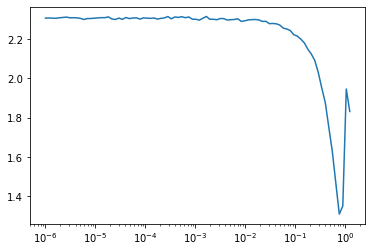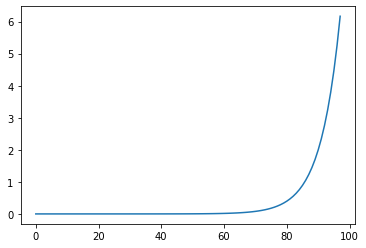%reload_ext autoreload
%autoreload 2
%matplotlib inline
#export
from exp.nb_05 import *
# import torch.nn.functional as F
# import torch.nn as nn
# import torch.optim as optim
Get Data¶
x_train,y_train,x_valid,y_valid = get_data()
train_ds,valid_ds = Dataset(x_train, y_train),Dataset(x_valid, y_valid)
nh,bs = 50,512
c = y_train.max().item()+1
loss_func = F.cross_entropy
data = DataBunch(*get_dls(train_ds, valid_ds, bs), c)
Callbacks¶
Previously, our Callback parent class was
#export
class Callback():
_order = 0
def set_runner(self, run): self.run = run
def __getattr__(self, k): return getattr(self.run, k)
@property
def name(self):
name = re.sub(r'Callback$', '', self.__class__.__name__)
return camel2snake(name or "callback")
# new to Runner 2.0
def __call__(self, cb_name):
cb = getattr(self, cb_name, None)
if cb and cb(): return True
return False
We're not altering the code for the TrainEvalCallback but now it is inheriting from our modified Callback parent
#export
class TrainEvalCallback(Callback):
def begin_fit(self):
self.run.n_epochs = 0.
self.run.n_iter = 0
def after_batch(self):
if not self.in_train:
return
self.run.n_epochs += 1./self.iters
self.run.n_iter += 1
def begin_epoch(self):
self.run.n_epochs = self.epoch
self.model.train()
self.run.in_train = True
def begin_validate(self):
self.model.eval()
self.run.in_train = False
We will define three types of Exceptions that our new Runner will use to control the training loop:
#export
class CancelTrainException(Exception): pass
class CancelEpochException(Exception): pass
class CancelBatchException(Exception): pass
Runner¶
We're going to remove all of the if self('some_method') and instead just call our callbacks:
#export
class Runner():
def __init__(self, cbs=None, cb_funcs=None):
cbs = listify(cbs)
for cbf in listify(cb_funcs):
cb = cbf()
setattr(self, cb.name, cb)
cbs.append(cb)
self.stop = False
self.cbs = [TrainEvalCallback()]+cbs
@property
def opt(self): return self.learn.opt
@property
def model(self): return self.learn.model
@property
def loss_func(self):return self.learn.loss_func
@property
def data(self):return self.learn.data
def one_batch(self, xb, yb):
try:
self.xb, self.yb = xb, yb
self('begin_batch')
self.pred = self.model(self.xb)
self('after_pred')
self.loss = self.loss_func(self.pred, self.yb)
self('after_loss')
if not self.in_train: return # exits if in validation mode
self.loss.backward()
self('after_backward')
self.opt.step()
self('after_step')
self.opt.zero_grad()
except CancelBatchException: self('after_cancel_batch')
finally: self('after_batch')
def all_batches(self, dl):
self.iters = len(dl)
try:
for xb, yb in dl: self.one_batch(xb, yb)
except: CancelEpochException: self('after_cancel_epoch')
def fit(self, epochs, learn):
self.epochs = epochs
self.learn = learn
self.loss = tensor(0.)
try:
for cb in self.cbs: cb.set_runner(self) # passes self as the runner object to each callback
self("begin_fit")
for epoch in range(epochs):
self.epoch = epoch
if not self('begin_epoch'): self.all_batches(self.data.train_dl)
with torch.no_grad():
if not self('begin_validate'):self.all_batches(self.data.valid_dl)
self('after_epoch')
except: CancelTrainException: self('after_cancel_train')
finally:
self('after_fit')
self.learn = None
def __call__(self, cb_name):
res = False
for cb in sorted(self.cbs, key=lambda x: x._order):
res = cb(cb_name) or res
return res
Other Callbacks¶
TestCallback¶
We now have the ability to completely kill the training in mid-epoch if we reach a certain condition.
This is done by simply raising the CancelTrainException
class TestCallback(Callback):
_order=1
def after_step(self):
print(self.n_iter)
if self.n_iter >= 10: raise CancelTrainException()
learn = create_learner(get_model, loss_func, data)
run = Runner(TestCallback())
run.fit(1, learn)
Recorder¶
Adding in the recording lrs for multiple param groups. And a new plot function that plots the losses against the lrs.
#export
class Recorder(Callback):
def begin_fit(self):
self.losses = []
self.lrs = [[] for _ in self.opt.param_groups]
def after_step(self):
if not self.in_train: return
for pg,lr in zip(self.opt.param_groups, self.lrs): lr.append(pg['lr'])
self.losses.append(self.loss.detach().cpu())
def plot_losses(self, skip_last=0):
plt.plot(self.losses[:len(self.losses)-slip_last])
def plot_lr(self, pgid=-1):
plt.plot(self.lrs[pgid])
def plot(self, skip_last=0, pgid=-1):
losses = [o.item() for o in self.losses]
lrs = self.lrs[pgid]
n = len(losses)-skip_last
plt.xscale('log')
plt.plot(lrs[:n], losses[:n])
Param Scheduler¶
Again adding functionality to deal with multiple param groups.
#export
class ParamScheduler(Callback):
_order = 1
def __init__(self, pname, sched_funcs):
self.pname = pname
self.sched_funcs = sched_funcs
def begin_fit(self):
if not isinstance(self.sched_funcs, (list, tuple)):
self.sched_funcs = [self.sched_funcs] * len(self.opt.param_groups)
def set_param(self):
assert len(self.opt.param_groups)==len(self.sched_funcs) # checking that begin_fit was called
for pg, f in zip(self.opt.param_groups, self.sched_funcs):
pg[self.pname]=f(self.n_epochs/self.epochs) # call the schedule function with the current position
def begin_batch(self):
if self.in_train: self.set_param()
LR Finder¶
LR Finder is supposed to help determine a suitable value for the learning rate.
#export
class LR_Find(Callback):
_order = 1
def __init__(self, max_iter=100, min_lr = 1e-6, max_lr=10):
self.max_iter = max_iter
self.min_lr = min_lr
self.max_lr = max_lr
self.best_loss = 1e9
def begin_batch(self):
if not self.in_train: return
pos = self.n_iter/self.max_iter
lr = self.min_lr * (self.max_lr/self.min_lr) ** pos
for pg in self.opt.param_groups: pg['lr'] = lr
def after_step(self):
if self.n_iter>=self.max_iter or self.loss>self.best_loss*10:
raise CancelTrainException
if self.loss < self.best_loss: self.best_loss = self.loss
learn = create_learner(get_model, loss_func, data)
AvgStats¶
#export
class AvgStatsCallback(Callback):
def __init__(self, metrics):
self.train_stats = AvgStats(metrics, True)
self.valid_stats = AvgStats(metrics, False)
def begin_epoch(self):
self.train_stats.reset()
self.valid_stats.reset()
def after_loss(self):
stats = self.train_stats if self.in_train else self.valid_stats
with torch.no_grad(): stats.accumulate(self.run)
def after_epoch(self):
print(self.train_stats)
print(self.valid_stats)
Test¶
run = Runner(cb_funcs=[LR_Find, Recorder])
run.fit(2, learn)
run.recorder.plot(skip_last=10)
run.recorder.plot_lr()
!python notebook2script.py 06_runner2.ipynb

